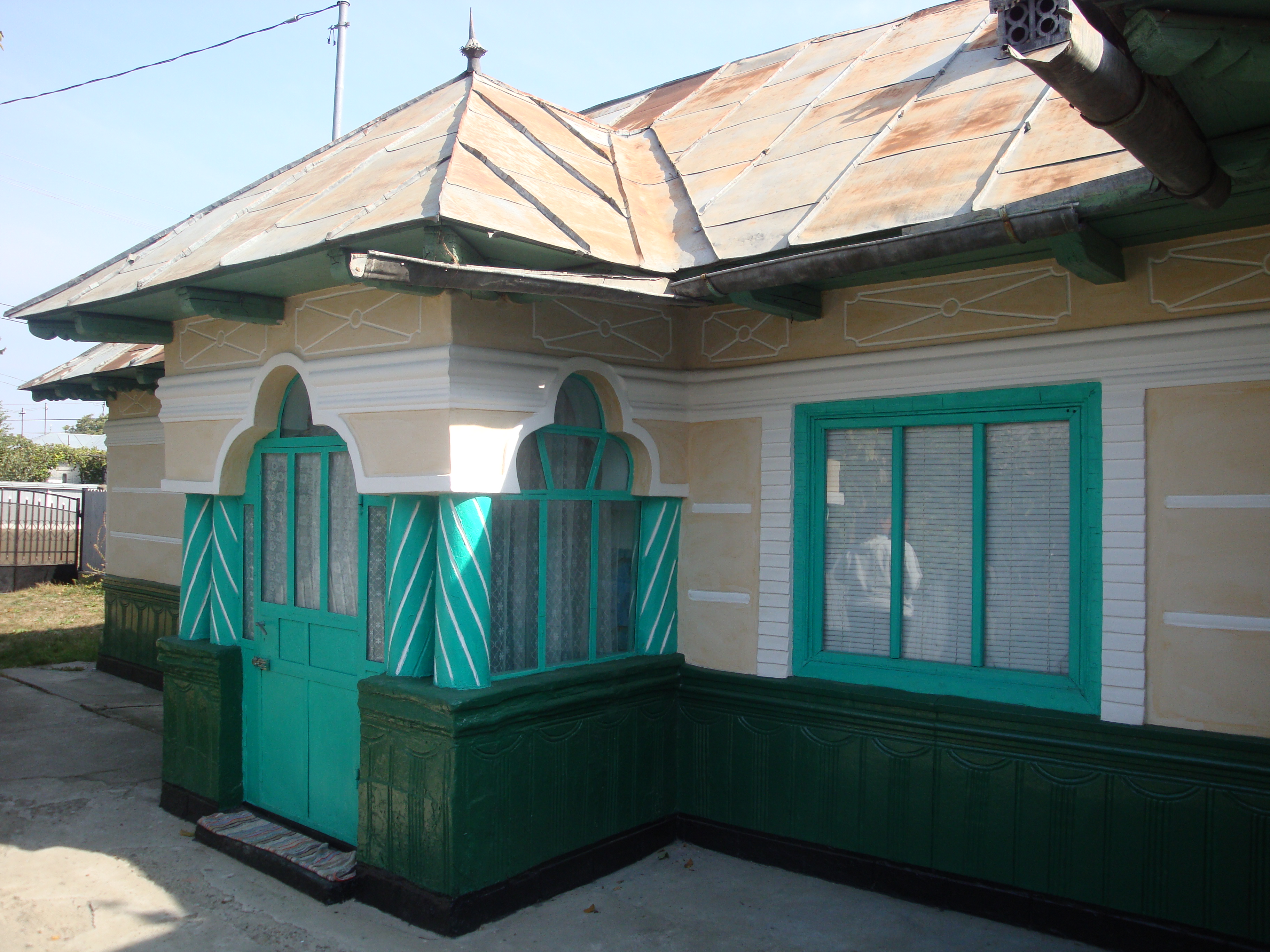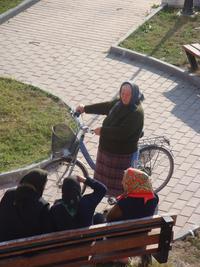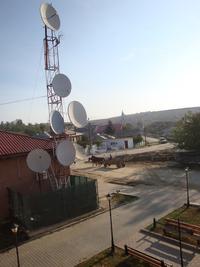
Traditional home in Buruineieşti (Photo C. Bezzi)
The migratory flow from Romania to other European countries has left behind hundreds of thousands of children, who are experiencing a “transnational childhood”. The phenomenon is particularly intense in the Romanian Moldova
Since the fall of the communist regime in 1989, the issue of Romanian children living in bedraggled state orphanages or on the dirty streets of Bucharest has received a lot of international attention.
Many international organizations and NGOs have arrived in the country since the early Nineties to implement various projects to improve the situation of children's rights not meeting the basic rights enshrined in the international convention of the Rights of the Child.
This intervention, together with the involvement of the Romanian civil society and the reorganization of the public system for child protection has led to an improvement of the situation. Nevertheless, the situation of children's rights in Romania is still grave.
With the intensification of the migratory flow from Romania to other European countries in 2004/2005, there arose the phenomena of so-called Romanian “unaccompanied minors”: children living in the big cities of France, Italy, and Spain without adult supervision and often involved in criminal activities. While these countries were worried about the new emergency of Romanian children within their national borders, the Romanian state was dealing with a new category of children in difficulty: the so-called “left behind”. Indeed, following the migration of many Romanian people looking for opportunities in other countries, many children where left home alone, or supervised by grandparents, neighbours or siblings.
Left behind: a new or an old phenomenon?
According to a national study (2008) carried out by Unicef and the association Alternative Sociale of Iaşi, there were 350 thousand Romanian children, 7% of the population between 0 and 18 years of age, with one or both parents living abroad. 126 thousand of them were under 10 years old and had both parents living abroad.
Other 400 thousand in the country have experienced at list once the departure of one parent. Therefore, out of 5 million of Romanians children, those affected more or less severely from their parents' departure would be totally 750,000.
In rural areas, the phenomenon was more intense, particularly in the depressed Romanian Moldova where there are 100 thousand children left behind, followed by Transylvania, Oltenia, and Muntenia.
The effects of parents' migration on their children's lives are various, but most of them experience a condition of stress which leads to problems including: school problems, involvement in micro-criminal activities, feelings of guilt and frustration, depression, and, in certain dramatic cases, to suicide.
As the psychologist Catalin Luca, director of the Romanian association Alternativa sociale, argues, the phenomenon of children left home alone is not a new one in Romania. During the Eighties, following the massive industrialization of the county, an entire generation grew up without adult supervision because their parents worked far from home, coming back late in the evening. This generation is called “children with the key at the neck”, because they wore their house keys around their necks so as not to lose them while their parents were away.
Many of these children, argues Luca, are today migrant adults and leave their own children home alone because they grew up to believe that it is more important for parents to provide for their children's material well being than to give affection or be present.
Nevertheless today's situation is much different, not only because parents aren't coming back in the evening, sometimes not even for years, but also because society has changed. Sociologist Lazaroiu Sebastian points out that during the Eighties while parents were away, school played an important role in children's socialization. Today, children left behind are missing a point of reference because their families are often split up or disrupted and the school is no longer an authoritative institution that provides discipline.
Romanian Moldavia
Romanian Moldavia, in the north east part of the country, is a rural and disadvantaged area with a high percentage of migrating people. For people from this area, migration is not a new experience. During socialism, many of them were forced to migrate from the countryside to other cities in the country due to the massive industrialization of the Seventies and Eighties. During the Nineties, most of the state factories closed down and, consequently, many Romanians came back to live in the countryside of Romanian Moldova or began to migrate abroad. Social problems and the breakdown of families increased after the fall of the communist regime, but are rooted in the past.
Buruineieşti is a small village of Romanian Moldavia, severely affected by floods in 2008. The village located in the region of Neamt is part of the municipality of Doljeşti ( 7,000 inhabitants), and according to the national authority for the labour force, the region had one of the highest unemployment rates (8% in 2009) of the country.
Walking around the village with Marzia Tiberti, the coordinator of a Caritas project for children in distress, we meet mainly men, children and elderly people. The village is full of houses rebuilt with national emergency funds the village received after the 2008 flood, and with the remittances of migrated people. Nevertheless, behind these new walls there are not always happy families. Marzia, an Italian aid worker, arrived in Buruineieşti after the flood and has lived in the village since 2008. Everybody here knows her and is very grateful for her work with the community.
Over several days, Marzia took me to the reconstructed homes of some families to talk with those who remained. The village's main residents are grandparents who care for children, even when their fathers are not abroad. As Marzia argues, alcoholism and violence against women are a social plague here, and many women of the village also migrated because of troubles with their husbands. In recent years, the incidence of divorce has also increased.
Victor1 is one of the child clients of the Don Bosco day centre, which Marzia directs. Victor is eight years old and lives together with his father, his six-year-old sister and his grandmother. His mother left to live in Italy four years ago and rarely comes back to visit and rarely communicates with her children or sends remittances home. Victor opens the small gate that separates the road from the house yard and smiles, happy to receive a visit form Marzia. We cross the vegetable garden and a small yellow field full of corn which his family has just harvested for income in an economy based on subsistence agriculture. His grandmother is there to welcome us in front of the small house made of mud and straw, which has not been affected by the flood. The woman, who is around 65 years old but looks to be 90, is skin and bones and gives us a toothless smile. After a while, a man appears, staggering under the effects of alcohol and walking barefoot in the black mud. He is Victor's father, and he starts to talk with us about his situation. Marzia asks Victor if he misses his mother. Victor doesn’t answer, but looks in the direction of his father, who answers him with an intimidating look. Marzia tries to explain to the man that it is normal for a child to miss his mother, but he doesn't listen at all and begins to curse his wife, who left him to go in Italy with one other man. We understand that we should not stay at the home longer, and Victor's very sad gaze also signals that it is time to leave.
Every family history is different. There are families that, with remittances, are able to provide education and better life conditions for their children and ease other disruptions.
Alina's families is fortunate because, even though they face difficulties, they are still a united family. Alina is 14 years old and both of her parents left just after the flood to earn money to build a new house. Before the flood, the entire family was living in a two room house, together with her grandmother and her uncle. When her parents left, Alina was eleven years old, her sister five. Her mother came back one or two times a year and the grandmother took care of the children. Today is Alina's day to take care of the housework and also take care of her grandma, who is seriously ill. Alina, last year, finished primary school with excellent marks, and she would like to continue her studies, but at the present moment that is not possible because she cannot leave her grandmother and her sister alone all day.
When mothers migrate
In recent decades, Europe has experienced a feminization of migration. Women often migrate from Romania because it has become easier for them to find a job elsewhere, specially after the economic crisis.
This has resulted in a care shortage in the country of origin of migration of these women, with all the related problems. Nevertheless, many families in Romania survive on the remittances of these women, giving their children an opportunity for a better future. The separation from the mother is always difficult for children, but again, not all stories are the same.
There are mothers who, despite the distance, keep communicating with their children and sending home remittances, and others who, when abroad, disappear leaving their children in the care of someone else. In some cases, children are left home alone, or supervised by a neighbour or an older sibling. This is the case of eight-year-old Andrei, who takes care of his five-year-old brother. Their home is close to their uncle's home, who is away at work all day. When Marzia and I enter the home's gate, the two brothers are playing alone in the garden and seem to be waiting for somebody. Marzia asks if they have had lunch, and Andrei answers that he just finished feeding his brother. Marzia asks again if he has had any news from his mother, reminding him that his mother needs to go to school to register him. Andrei says that he spoke with her yesterday and that she may come home for Christmas from Spain, where she works. Andrei likes school a lot, but is missing classes because his parents' school registration signature is missing. After the meeting, Marzia explains to me that she arranged with the director of the school to register Andrei for this year. She supposes that yesterday's conversation with his mom is invented. In the past, Andrei once said that his mom returned to the Don Bosco centre, describing a very detailed conversation with her. In time, Marzia discovered that she had never come back from Spain at all.
Children left behind or transnational childhood?
A recent international study by the European Union focuses on the rights of children re-migrated to Romania from Spain and Italy. According to the study, many of the so-called “left behind” children, in fact, have joined their parents abroad once their parents have achieved a better situation in the host country. The study also shows that between January 2008 and May 2011, 21,3252 children returned from Spain and Italy and were re-registered in the Romanian educational system.
It is important to understand that we are facing a new family model that is a result of the EU enlargement process: the transnational family.
The process of migration within the EU will continue in the coming years. Migrants' ability to seek a better future for themselves and their children is a fundamental freedom that cannot and should not be limited. Therefore, it is important to understand how to deal with this phenomenon in order to reduce negative consequences for the most vulnerable members of the population: children.
1 The names of the children referred to in this article are fictitious to defend their privacy.
2 For further details about the Romanian part of the study: http://www.alternativesociale.ro/index.php?option=com_content&view=article&id=266&Itemid=53
Hai pensato a un abbonamento a OBC Transeuropa? Sosterrai il nostro lavoro e riceverai articoli in anteprima e più contenuti. Abbonati a OBCT!
blog comments powered by











